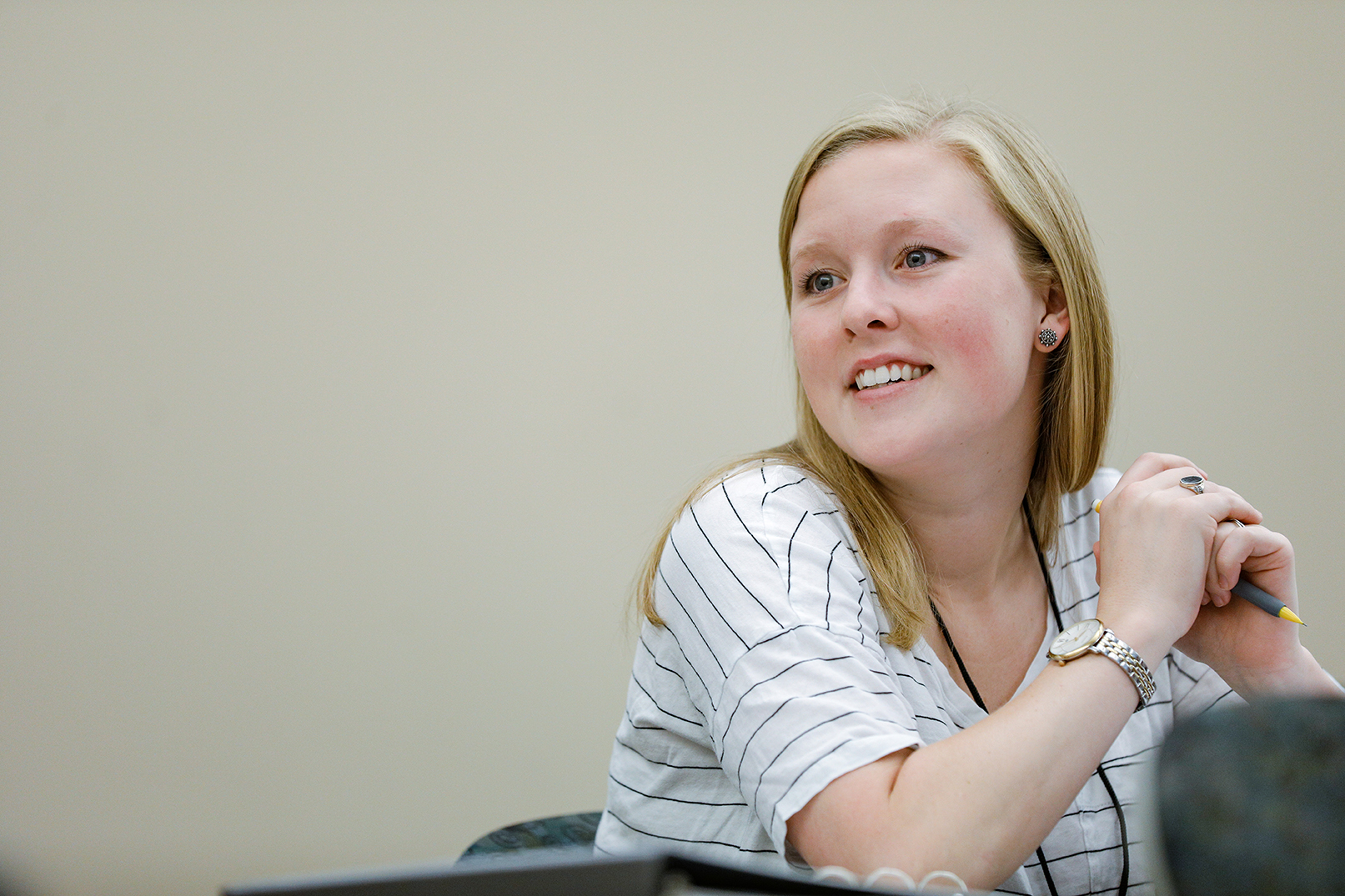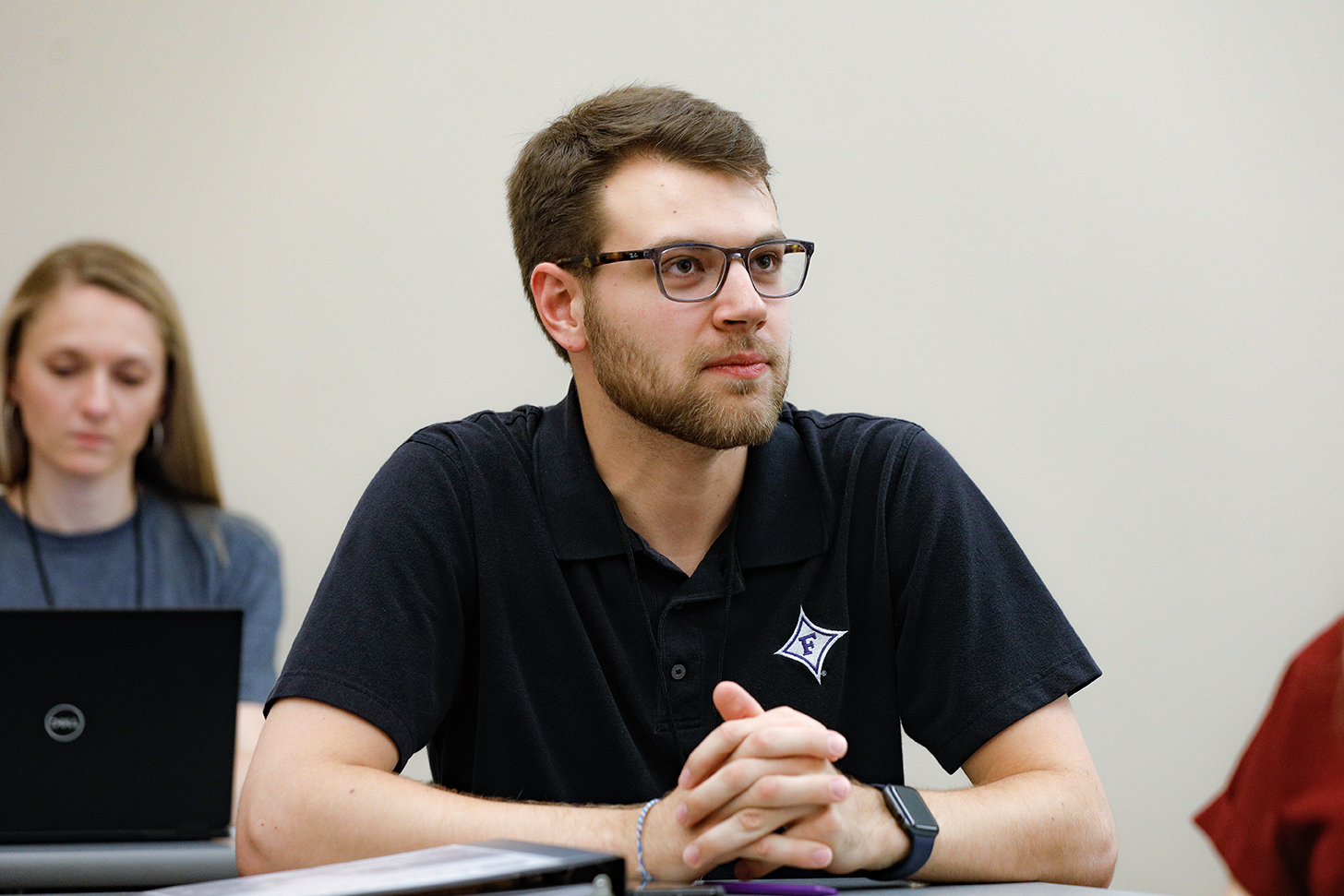16 students attend first Summer Business and Entrepreneurship Boot Camp
At the very heart of entrepreneurship lies the concept that anyone can have an idea, but without the skills to bring it to life, an idea will remain just that. Addressing this fundamental need for every aspiring entrepreneur was the motivation for Furman’s inaugural Summer Business and Entrepreneurship Boot Camp, which took place June 3-21.
Designed specifically for non-business majors by Furman’s Office for Innovation and Entrepreneurship, the program sought to arm students from five different universities with “the foundations of business and fundamentals of entrepreneurship.”

Meghan Probst ’17 smiles during class at Furman’s Summer and Business Entrepreneurship Boot Camp.
Meghan Probst ’17 is a post-baccalaureate fellow with the Institute for the Advancement of Community Health (IACH), and she signed up for the camp in an effort to maximize the potential of her undergraduate degrees.
“I was a psychology and Spanish major here and didn’t really know what I wanted to do with it,” she said. “I thought this was a great opportunity to broaden my skillset and look into something that I really had never taken any classes in and have no background in but something I think would be really helpful regardless of what field I go into.”
Weeks 1 and 2 focused on business foundations, while week 3 added entrepreneurial fundamentals. Classes were taught by Furman professors, and campers also heard from 17 guest speakers from a variety of businesses in the Greenville area. There were also three field trips.
The camp culminated with teams of four making business pitch plan presentations followed by a graduation.
Associate Professor of Philosophy Aaron Simmons served as the Business and Entrepreneurship Boot Camp faculty director. He and Office for Innovation and Entrepreneurship Executive Director Anthony Herrera worked for months to organize the camp, with an eye on helping students in all academic disciplines maximize their individual talents in their own unique spaces.
“(We thought), ‘How can we create a space where the students who have different sorts of backgrounds and interests and passions and directives can now have … those skillsets so that when they enter that space they aren’t intimidated by that perception that others have something they don’t have, when in fact in many cases they’ve got plenty that others don’t have?’” Simmons said. “The beautiful marriage of what schools like Furman are able to offer is that we aren’t saying you have to do ‘X’ in order to do ‘Y.’ No, let’s figure out what needs to happen and then try to figure out what most prepares you to be able to make that happen.”

Payton Isner ’19 listens during class at Furman’s Summer and Business Entrepreneurship Boot Camp.
Peyton Isner ’19 isn’t sure if he wants to start his own business. He is sure he wants to be able to be innovative no matter where he’s working.
“The reason I signed up is I was a history student here, had originally planned to go into teaching, and decided at the last minute to go into healthcare,” said Isner, who will soon begin pursuing a master’s degree in healthcare administration at Cornell University. “I can see (my own business) being a potential idea, but in the short term I’m more interested in getting my MHA degree and then working in some kind of hospital system and maybe transform something that is already existing.”
Classes were held in Hipp Hall 204, and of the 16 participants, 12 were either current Furman students or Furman graduates. Other students came from Wake Forest University, Davidson College, North Greenville University and Centre College, with majors ranging from biology to computer science to studio art.
Furman Assistant Professor of Finance John Handy taught several finance modules at the camp. He thinks the mingling of liberal arts and business is more than necessary — it’s natural.
“Business is not a liberal art. The closest you’ll get at most traditional liberal arts colleges is economics, and that’s my background,” he said. “If you can teach business with this liberal arts flair, you’ll be better than any institution that doesn’t have that. I think that’s what Furman really brings to the table, and I think that’s what this camp really brings to the table.”
Herrera called it “business and entrepreneurship with a heart.” Simmons said the feedback from students validated the work that went into the camp.
“I had two alums say to me … that despite how much they had learned at Furman, they felt like this boot camp has triggered them and gotten them excited for moving on to the next stage of their life in ways that their whole educational experience hadn’t,” he said. “I don’t think that’s a failure of Furman. I think it’s actually a testament to what the boot camp has been able to pull off.”
Furman’s Office for Innovation and Entrepreneurship was launched prior to the 2018-19 academic year to help emerging entrepreneurs move from idea to concept and venture to sustainable business, while making meaningful and socially responsible contributions locally and regionally. According to a new study conducted by the university’s Department of Economics, Furman’s annual economic impact on Greenville County and the surrounding Upstate counties is more than $297 million.
For more information on the Office for Innovation and Entrepreneurship, contact Herrera at 864-294-2220 or Anthony.Herrera@furman.edu.